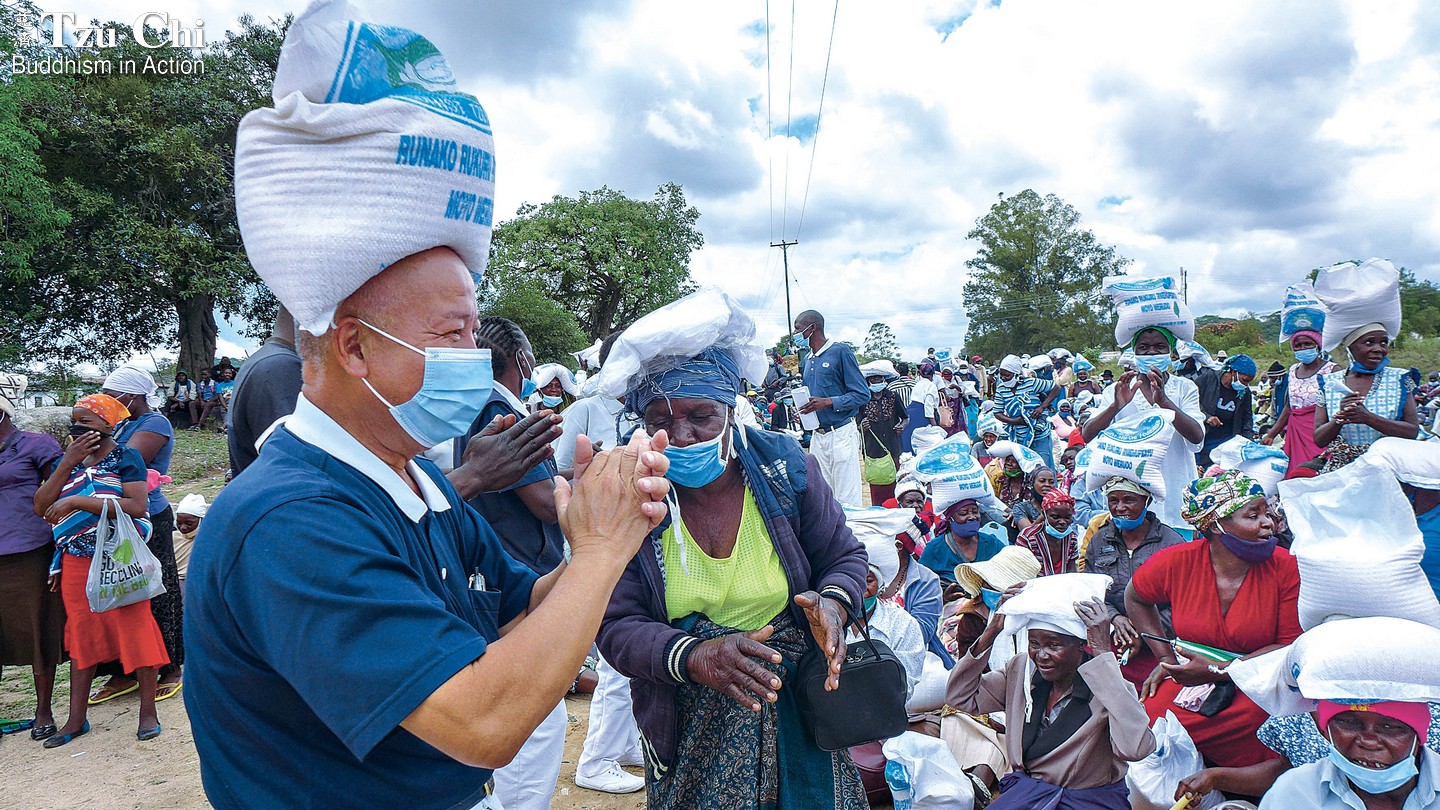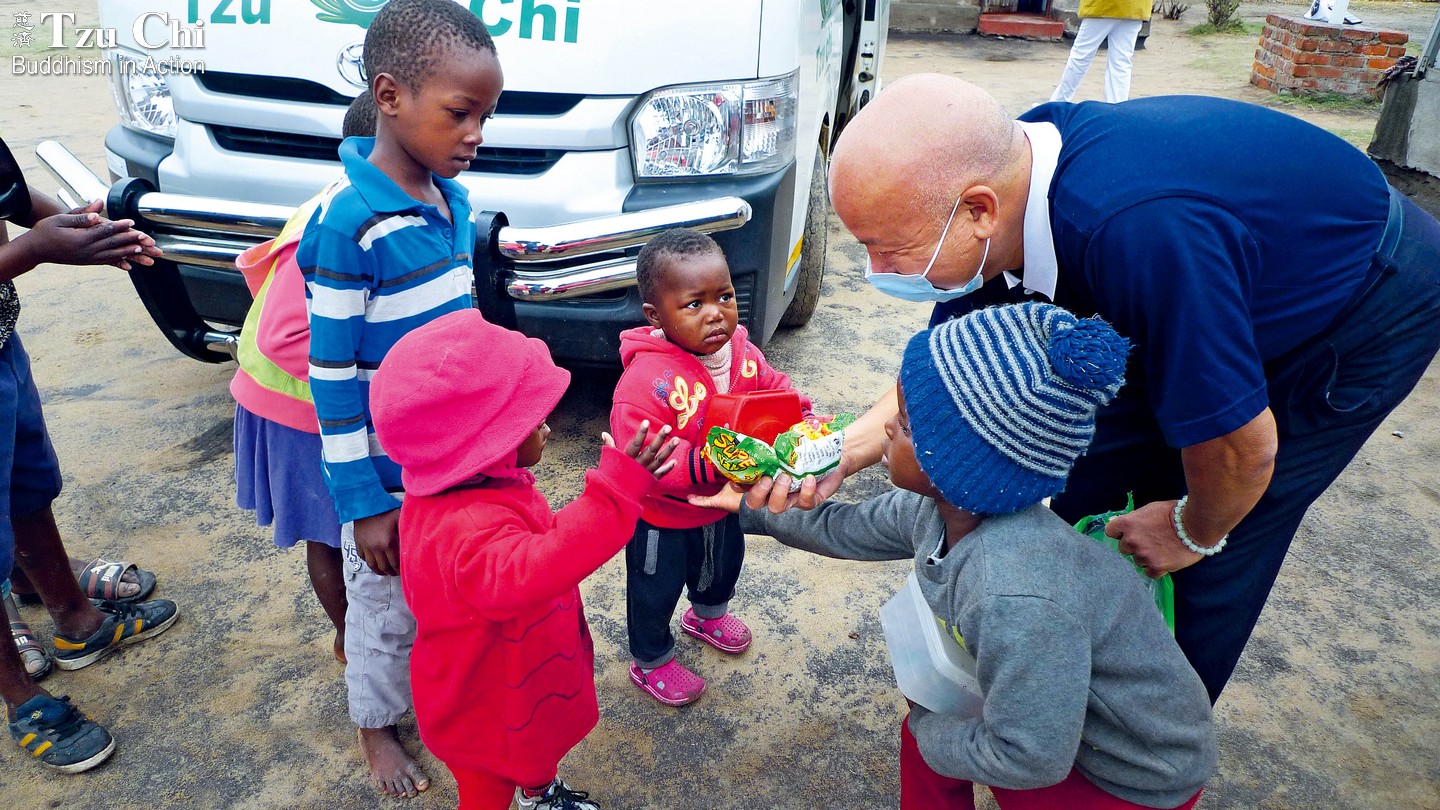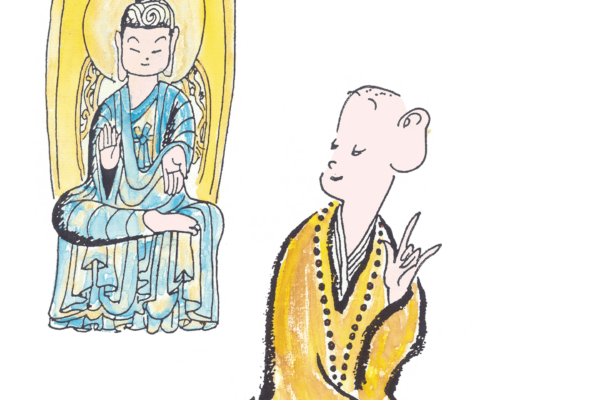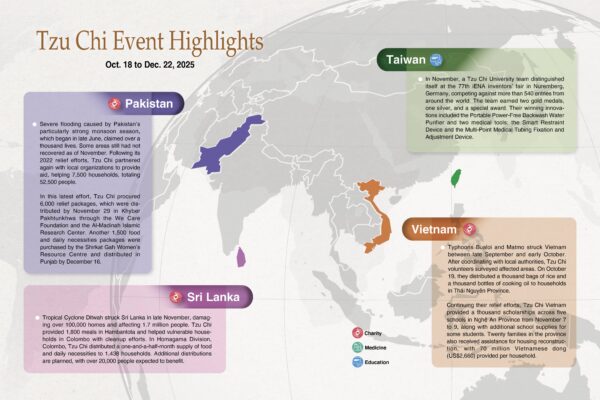By Zhang Li-yun
Translated by Wu Hsiao-ting
Photos by Hlengisile Jiyane
“Please spread my ashes over the places I’ve visited in Zimbabwe. I want to continue to help suffering people in this country in my next life.” These were the instructions from Tino Chu, a Tzu Chi volunteer in Zimbabwe, to his wife when his condition became critical after he was diagnosed with COVID-19.

Tino Chu (left) and other Tzu Chi volunteers in Zimbabwe distribute rice and blankets to underserved families in Gutu, Masvingo Province, to help them through the difficult time of the pandemic.
The government in Zimbabwe announced a nationwide lockdown in March 2020, even before the coronavirus began to escalate in the country. Public transport was banned, checkpoints installed, and police went on patrol to stop anyone who was out and about without movement permits. It was all but impossible to leave one’s home, let alone travel to another village or out of town.
Under such circumstances, Tino Chu (朱金財), head of Tzu Chi Zimbabwe, had no choice but to stay at home like other people in the country. Though he remained homebound, he was deeply concerned about destitute families in the country. After all, they had no ability to stockpile food and were likely on the brink of hunger.
On the third day of the national lockdown, a customs broker delivered some shipping container documents to Chu. Seeing that the broker was still able to move around freely despite the restrictions, Chu asked him how he had obtained his movement permit. Soon thereafter, Chu contacted the responsible authorities and asked about applying for movement permits for him and other volunteers. “We were fortunate in that Tzu Chi’s charity efforts in Zimbabwe had won affirmation from local government officials,” Chu explained. “As a result, five other volunteers and I were granted movement permits.”
As soon as his permit was in hand, Chu drove two carloads of daily necessities to the other volunteers’ homes to be delivered to needy people. Concerned that they might be robbed on their way to deliver the items, the volunteers opted not to transport their goods with hand trucks. Instead, they wrapped the goods in cloths and, balancing them on their heads, delivered them to one household after another. The poor didn’t need much to get by. They were overjoyed when they received the rice, cooking oil, sugar, and salt from Tzu Chi.
The lockdown, extended again and again, lasted about six months. During that time, people were not allowed to go out to work, public facilities were closed, and only one in ten government employees were able to report to work. But thanks to their permits, Chu and the five other volunteers were able to surmount all difficulties and continue distributing aid to the disadvantaged. They and other volunteers were even allowed to start providing hot food at a few fixed locations.

A family in Hatfield, Harare, Zimbabwe, happily displays the rice, cooking oil, sugar, and soap Tzu Chi volunteers delivered to them during lockdown.
Shortly before Christmas, Tzu Chi held 14 distributions in 11 towns and villages to help people have a better Christmas. Nine thousand impoverished households benefited from the distributions. Volunteers reminded each other during each event not to relax their precautionary measures. “Watch out for your own safety when you help others,” they’d say.
Despite all the precautions he took, Chu became infected with the coronavirus. “I was surprised when I fell ill in January this year,” he said. He explained that it started with a slight cough and a fever. He didn’t think it was COVID-19 at first, and it was only when his condition continued to worsen that he, at the urging of his family, went to the hospital to have a checkup. More than ten days had passed by that time, and he was so ill when diagnosed with the disease that he had to be put on a ventilator.
Despite the treatment, his condition didn’t improve. On the third day of his hospitalization, he had such difficulty breathing that he felt that he might not survive the night. As he drifted in and out of consciousness, he started putting his affairs in order. He told his wife to spread his ashes over the places he had visited in Zimbabwe. “That way, I’ll remember to come back to the country. There is so much suffering here. I must come back here in my next life to continue helping the people here.”
Chu’s wife was very worried about him. She knew that her husband cared most about relieving the plight of impoverished people in Zimbabwe, and had felt that way since they had immigrated to Zimbabwe from Taiwan over two decades ago. Therefore, to strengthen his will to live, she said to him, “I promise to do anything you ask me to do. But has it occurred to you that if you leave the world now, what will all those suffering people in Zimbabwe do? You should work harder to get well instead of pinning your hope on your next life. You should consider what you can do now to provide immediate relief to the people who are struggling to get through the pandemic.”
Though he was very weak, Chu drew a sharp breath when he heard the words “Zimbabwe” and “suffering,” and he felt his mind clear all of a sudden. He thought to himself: “That’s right. If I die now, leaving all those Zimbabweans behind, how long will they have to wait until I come back?” His wife’s remark was like a wakeup call bringing him to his senses. He told himself he had to fight hard to live on.
When the Tzu Chi volunteers in Zimbabwe learned that their beloved “Brother Chu” had fallen victim to the coronavirus, they all wanted to go to the hospital to visit him. Chu asked his family to tell them, “Please keep on working for the needy. I’ll soon be back with you to continue working with you.”
Chu’s condition improved two weeks later. Thinking back on his close brush with death, he realized that it was the needy in Zimbabwe that had given him the strength to live on.
After his recovery, he shared with his fellow volunteers what he had experienced during his illness. He encouraged them to keep going, to carry on the torch of Tzu Chi, so that they could serve as many people as possible and inspire hope and love in each person.

Tino Chu interacts with young children in Epworth, Harare. He cares for the underserved in Zimbabwe so much that he wants to continue serving them in his next life.



